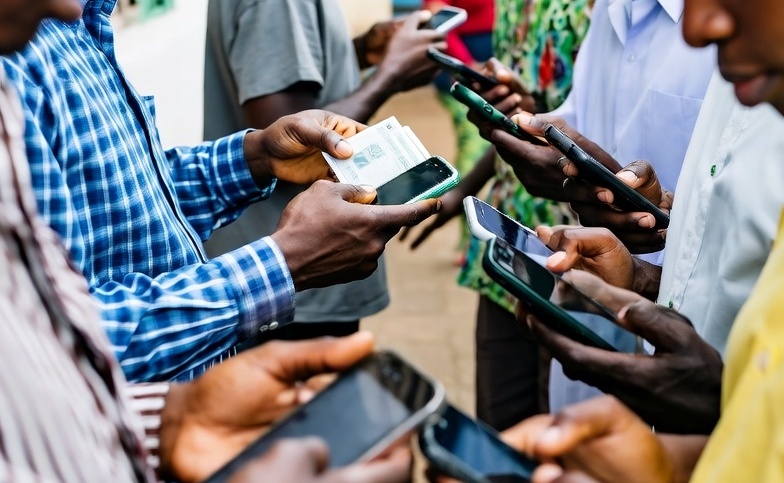Michael Olugbode in Abuja
The Director General of the National Agency for the Prohibition of Trafficking in Persons (NAPTIP), Binta Bello, OON has led a high-powered special operation at the Nnamdi Azikiwe International Airport, Abuja, during which 24 suspected victims of human trafficking were rescued and arrest of five suspected trafficking agents was made.
According to a statement on Wednesday by the agency’s National Press Officer, Vincent Adekoye, among the suspected human traffickers arrested at the airport was a retired Senior uniform Officer with one of the foremost Law Enforcement Agency in the country, who is alleged to be a prominent member of the trafficking syndicate operating within the South West region of Nigeria.
He said: “The well-planned action, which was hailed by other travelers at the airport, was a continuation of the newly unveiled anti-human trafficking efforts and onslaught against human trafficking by the Director General, targeting recruitment hubs, trafficking spots, and routes within Nigeria.”
Adekoye recalled that following reported increased cases of recruitment and trafficking of Nigerians for various forms of exploitation both within and outside the country, the Director General of NAPTIP had few months ago ordered a step up surveillance and monitoring of all parts of the country with greater attention on motor parks, waterways in the coaster States as well as International airports.
He disclosed that the latest raid followed a tip-off from concerned stakeholders and partners who alerted to an influx of suspected human trafficking victims at the Nnamdi Azikwe International Airport, Abuja, and the unwholesome activities of some suspected traffickers.
Adekoye said at the end of nearly six hours of operation, the human trafficking activities were completely disrupted,leading to the arrest of five suspected traffickers and the rescue of 24 suspected victims.
He said the victims whose ages range between 15 years to 26 years were recruited from Kano, Kastina, Oyo, Ondo and Rivers States, and were heading to Iraq, Sudan, Egypt, Saudi Arabia, Bahrain, and Afghanistan.
He noted that while a good number of the suspected victims could not communicate in any other language apart from their dialect, others do not even know the location of their intended country of destination.
He quoted one of the them to have said: “They told my mother that they are taking me to Europe, where I will work and earn dollars. My parent were happy and they allowed me to follow them.”
Adekoye said it was another mild drama at the Headquarters of NAPTIP as one of the victims vowed to ensure the prosecution of her father for deceiving her into embarking on the journey.
He revealed that the drama ensued after the Director General had personally counseled the suspected victims and enlightened them with a series of video clips of some stranded Nigerians and those on life support after being exploited at the destination countries.
The particular suspected victim was quoted to have said: “I struggled to hold my emotions while watching the video of those girls who were being maltreated and beaten by the traffickers. If that is what awaits me there, I will not go. I am seriously annoyed with my father because he deceived me. My father told me that his friend has a job for me at a supermarket in Baghdad. He did not tell me that it is in Iraq. I know that Iraq is not a good place to work for now to work due to the crisis there, but I did not know that Baghdad is in Iraq. I thank the DG and her officers for rescuing me, pls, I just need my passport, I want to go back to my town and settle.
“I will certainly make it here rather than suffer in another country”, the victim, whose father was among the traffickers arrested, added in her local dialect.
Speaking on the development, the Director General of NAPTIP, Binta Bello, expressed sadness over the activities of some suspected human traffickers and unregistered labour recruiters who have continued to deceive, recruit, and traffic Nigerians for various forms of exploitation.
She said: “I am impressed with the outcome of the operation today because we were able to arrest five suspected members of the trafficking gang that have been recruiting and trafficking our citizens to various tension-soaked countries, especially in the Middle East, for exploitation.
“We observed that the Nnamdi Azikwe International Airport is becoming a comfort zone for these traffickers, and that is why we have decided to shift attention to this airport. We will sustain this raid until they stop this unpatriotic and illicit trade in human beings.
“I was amazed that a father, who is a retired Law Enforcement Officer of senior cadre, deceived his daughter and packaged her to be trafficked to Iraq for exploitation. This is incredibly unbelievable. Well, all of them will be thoroughly investigated, and they will face the law.
“I sincerely thank and appreciate the Director General of the Federal Airport Authority of Nigeria (FAAN), the Nnamdi Azikwe International Airport Manager, and all the wonderful personnel of the authority for their support for us at NAPTIP. I also appreciate the collaboration of the Department of State Service (DSS) operatives at the Airport, the Airport Security Personnel, Immigration Officers,, and airline operators for their support.
“Human trafficking is a visible national concern, and we all must be on the same page to turn the heat on the traffickers. Our resolve to ensure the protection of Nigerians from all forms of exploitation is firm and resolute”, the Director General of NAPTIP declared.



